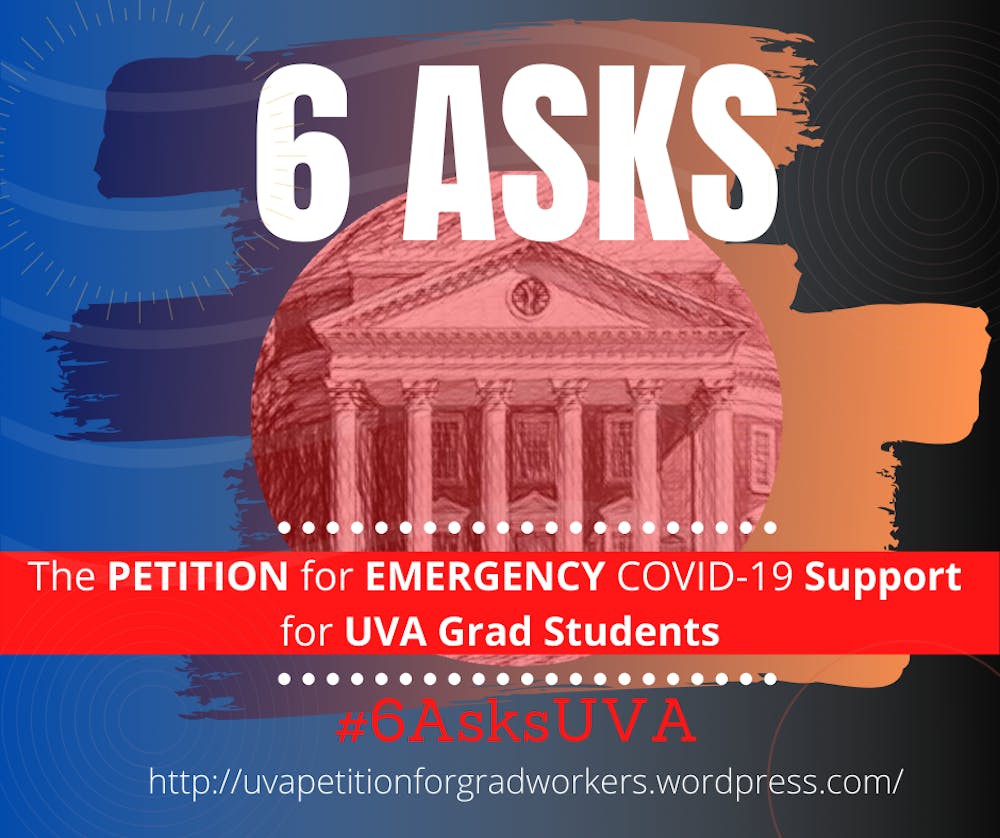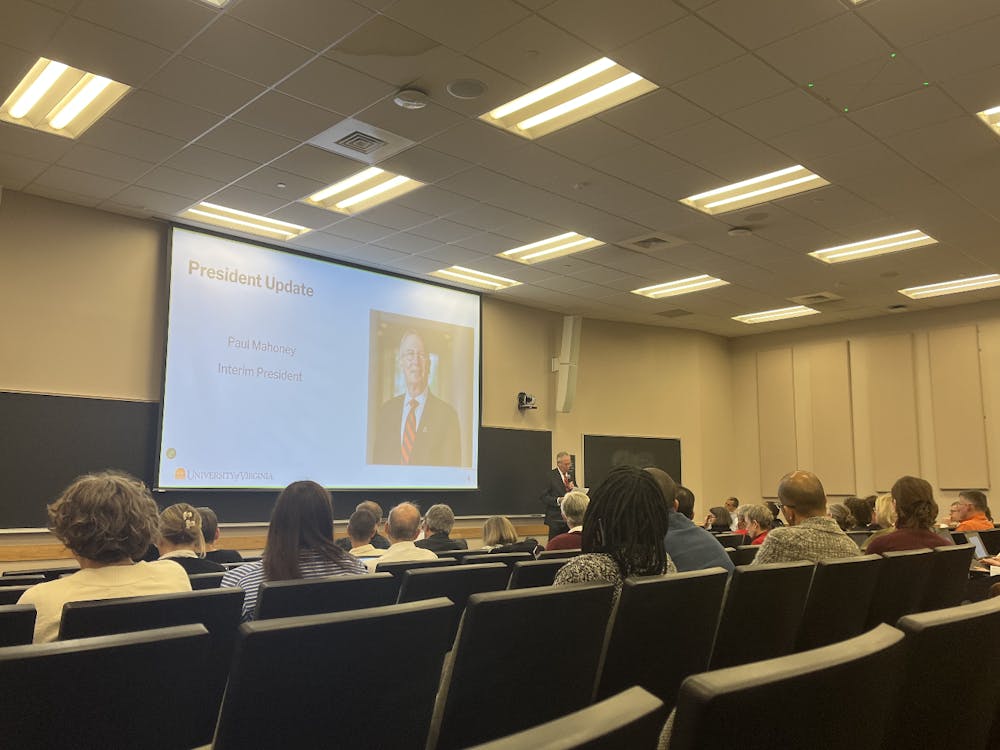Students from the Religious Studies Graduate Student Association have crafted a petition calling on the University to support graduate students during the COVID-19 pandemic. To encourage a response from University administration, students from the RSGSA — in coordination with other groups across the Graduate School of Arts and Sciences — launched the #6AsksUVA campaign.
The petition has been endorsed by the Graduate English Student Association, the Anthropology Graduate Student Collective, the Latinx Graduate Student Alliance and the Graduate History Student Association. It calls on the University to fulfill “six asks” to support its graduate students as their teaching, research and lives have been affected by the COVID-19 pandemic in different ways.
“We call on the University to do the right thing by this highly vulnerable constituent body,” said Kevin Rose, co-chair of the Religious Studies Graduate Student Association and fourth-year PhD student. “They are critical to the here and now of learning at U.Va., but also to the future of Religious Studies — their own and the University’s.”
Three of the petition’s six demands pertain to Ph.D. students — one of which is to postpone and extend time for the completion of milestone requirements — such as the completion of dissertation proposals and comprehensive exams — by one year. The petition explains that graduate students now face increased childcare and family responsibilities, as well as the loss of crucial research opportunities, which may delay their studies.
In a press statement, Rose cited the University’s recent decision to extend the probationary period for tenure-track professors and noted that similar expectations should apply to graduate students, who also have research and teaching that have been disrupted by the COVID-19 pandemic.
“The University has acknowledged that it’s unreasonable to expect an assistant professor in the humanities, with shifting teaching and personal responsibilities, to get their first book published on the same timeline,” Rose said. “We ask the University to consider whether it can expect its graduate students to complete their dissertations on the same timeline.”
The petition also calls on the University to provide funding, such as grants or fully-funded teaching and research opportunities, and provide affordable healthcare coverage for Ph.D. students during the COVID-19 pandemic.
“Graduate students close to completing their programs face near-certain unemployment in a failing economy and the loss of health insurance during a public health crisis,” the petition reads. “To avoid catastrophic impacts on late stage graduate students and those on the job market, the University must extend and expand funding opportunities for all Ph.D. students.”
The petition also requests the University to provide masters students with the option of taking an additional semester to complete their theses because students have had to cancel interviews, travel, summer programs and other research opportunities due to the COVID-19 pandemic.
To protect international students, the petition requests that the University ensures graduate students on F-1 and J-1 visas can maintain their visa status and can access financial assistance if it is given to domestic students. Of the University’s graduate students, 30 percent are international and thus face different obstacles — such as visa challenges and travel complications — as the COVID-19 pandemic wreaks havoc across the globe.
Finally, the petition calls on the University to provide graduate students with formal channels through which they may provide input on future decisions pertaining to expectations for remote teaching and research, should remote learning continue in the fall. Graduate students were not asked to respond to the survey distributed May 3 that allowed undergraduate students to provide their perspectives on several potential scenarios for the fall semester.
The Religious Studies Graduate Association launched the #6AsksUVA campaign May 11 through May 15 in support of the petition, which culminated in a community forum Friday. During the forum, graduate students shared testimonials and heard commentary from Edward Barnaby, senior assistant dean for Graduate Programs.
During the forum, graduate students expressed concerns ranging from increased workloads due to transitioning online to the need to craft accomodations for disabled graduate students who face particular difficulties with COVID-19. Several students detailed their own experiences both teaching and researching throughout the pandemic.
Devin Zuckerman, a religious studies Ph.D. student, recounted her experience getting evacuated from her field site in Kathmandu, Nepal, where she had been living and researching for the previous 10 months on a Fulbright grant. In addition to many of the problems mentioned earlier, Zuckerman said that graduate students also face several “nonquantifiable obstacles” — such as stress and anxiety caused by the pandemic — that must be considered by the University, as they have made studying, teaching and research more difficult.
“The evacuation was stressful, having to pack up and leave my world; not having housing in the U.S. is stressful; not having a plan for the future, as well as having immunocompromised family members, sick family, family and friends who have lost work,” Zuckerman said. “Not only do I not have access to material research resources, I also don’t have access to the full range of my intellectual and organizational and creative abilities right now. That is also an obstacle to the timely completion of my dissertation and the quality of my dissertation.”
Another religious studies Ph.D. student, Essam Fahim, said that he has been forced to juggle teaching his 60 undergraduate students, balancing his studies and providing for his family— ever since his three-year-old’s preschool closed, he has only had about two to three hours per day available to work. As an international student, Fahim also didn’t receive a stimulus check and is struggling with a sick mother at home in Pakistan. Behind in his studies and coping with several obstacles, Fahim said that he needs support from the University during this time.
Barnaby wrote in an email to The Cavalier Daily that the Arts and Sciences dean’s office has created several committees to guide the work of the Arts and Sciences Dean’s office in a variety of areas — including those areas of concern cited during the forum and in the petition. The first — the Arts and Sciences Graduate Education Committee — will be made up of both faculty and students and plans to make recommendations as to the academic and financial support needed to ameliorate disruptions caused by the pandemic.
In addition, the Arts and Sciences Fall 2020 Committee will make recommendations to the dean’s office as plans for the fall semester are announced, and the Arts and Sciences Research Committee will make recommendations to the dean’s office about restoring research activity. The exact members of these committees have not been decided, but they will also include graduate students.
The Graduate School of Arts and Sciences is also providing $4,000 summer fellowships to doctoral students who were enrolled full-time during the 2019-2020 academic year and received no more than $20,000 of support overall. While students who graduated in May do not qualify for these fellowships, the school plans to implement a pedagogy-related internship program to which these students may apply.
Finally, University Provost Liz Magill has also created a working group to understand the impact that the pandemic has had on graduate education. It is led by Phillip Trella, associate vice provost and director of the University’s Office of Graduate and Postdoctoral Affairs, and Vice Provost for Academic Affairs Archie Holmes, and includes graduate student representatives.
Barnaby also noted that he would be happy to receive additional comments from graduate students as they work through these issues together and suggested that graduate students may also find organizations such as the Graduate School of Arts and Sciences Student Council helpful.
As of May 18, the petition has 346 signatures, 75 of which are faculty or staff and 265 of which are graduate students.
Correction: A previous version of this article misstated that the Arts and Sciences Dean's Office planned to create the committees detailed in this article in response to the #6Asks Petition. The article has been updated to state that these committees have already been formed to address various different issues, independent of the forum and petition.







